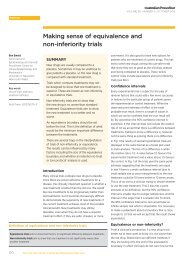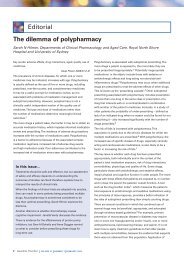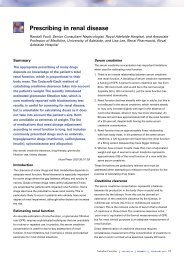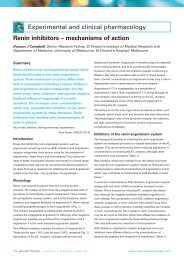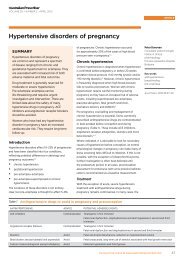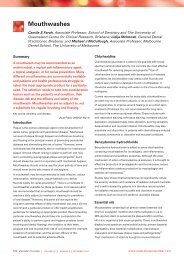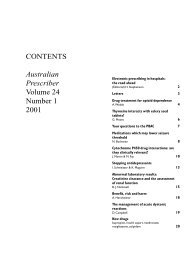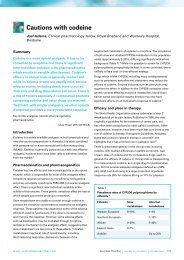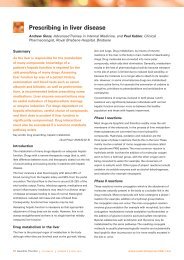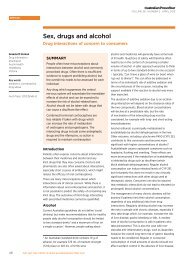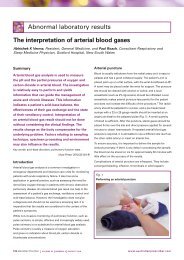download the full PDF issue - Australian Prescriber
download the full PDF issue - Australian Prescriber
download the full PDF issue - Australian Prescriber
Create successful ePaper yourself
Turn your PDF publications into a flip-book with our unique Google optimized e-Paper software.
Not including all relevant outcomes<br />
When analysing clinical study data all relevant outcomes should<br />
be considered, however it may not be clear which outcomes are<br />
important. Often clinical trials do not have <strong>the</strong> statistical power<br />
to detect important adverse events.<br />
Rofecoxib was withdrawn after showing an increase in<br />
cardiovascular deaths with sustained use. Trials of rofecoxib<br />
(such as <strong>the</strong> VIGOR trial8 ) had noted but not emphasised this<br />
outcome, and attempted to explain it away. As a result, approval<br />
of <strong>the</strong> drug in world markets was based purely on equivalence<br />
of pain-relieving effects and decreased gastrointestinal adverse<br />
effects. Yet <strong>the</strong> possibility of adverse cardiac outcomes was<br />
apparent to experts soon after <strong>the</strong> drug's release. 9<br />
When trials are stopped early it may also be difficult to assess<br />
all relevant outcomes. Rules for stopping trials tend to rely on<br />
only one outcome (such as improvements in mortality) and may<br />
lead to o<strong>the</strong>r outcomes being ignored.<br />
Placebos and semi-placebos<br />
Trials need to ask <strong>the</strong> right question. Testing a drug against<br />
an inappropriate comparator or an inappropriate dose of a<br />
comparator can mislead practitioners. While <strong>the</strong>re continues to<br />
be a place for placebo-controlled trials, <strong>the</strong>re is no justification<br />
for use of 'semi-placebos' such as an inappropriately small dose<br />
of a competitor's drug.<br />
A 1994 article entitled 'The continuing unethical use of<br />
placebo controls' suggested that wherever an established<br />
treatment existed, it should be used in trials in place of a<br />
placebo. 10 Avoidance of placebos began to be seen as an<br />
important ethical principle and led to increasing numbers<br />
of so-called 'equivalence trials' in which new drugs were<br />
shown to be equivalent to older drugs ra<strong>the</strong>r than superior to<br />
placebos. Such trials may not always be clinically useful, and<br />
<strong>the</strong>y assume that <strong>the</strong> established treatment has previously<br />
been shown to be significantly superior to a placebo. 11 Critical<br />
appraisal of any drug trial that is not placebo-controlled must<br />
<strong>the</strong>refore rely on expert knowledge of <strong>the</strong> evidence for <strong>the</strong><br />
comparator drug.<br />
Conflation and o<strong>the</strong>r complexities<br />
An excellent summary of <strong>the</strong> problems encountered in critical<br />
appraisal warns about <strong>the</strong> <strong>issue</strong>s that arise from 'conflating'<br />
trials. 12 It uses <strong>the</strong> example of <strong>the</strong> PROGRESS trial – which<br />
purported to show <strong>the</strong> benefits of ACE inhibitors after stroke. 13<br />
In fact, <strong>the</strong> PROGRESS trial actually shows a benefit from<br />
indapamide as a second-line agent, or from combinations<br />
of antihypertensives, ra<strong>the</strong>r than from an ACE inhibitor<br />
alone. Although <strong>the</strong> problem was noted by <strong>the</strong> editorial that<br />
accompanied <strong>the</strong> trial14 , <strong>the</strong> result was so obscured within <strong>the</strong><br />
paper that we believe only expert epidemiologists could come<br />
to <strong>the</strong> correct conclusion.<br />
Evidence-based medicine downplays <strong>the</strong> role of experts,<br />
suggesting that we can all undertake critical appraisal. Yet an<br />
expert view of trials such as VIGOR would have differed from<br />
that of a general medical reader, not because of differing skills<br />
in critical appraisal, but because of a different knowledge of<br />
background <strong>issue</strong>s. High levels of expertise in critical appraisal<br />
are also required for <strong>the</strong> interpretation of some trials in which<br />
key features may be deliberately hidden.<br />
Until 2003, <strong>the</strong> Medical Journal of Australia published a series<br />
called 'EBM in action' in which <strong>the</strong> authors attempted to answer<br />
clinical questions by using techniques of critical appraisal. At <strong>the</strong><br />
end of <strong>the</strong> series <strong>the</strong> authors appeared somewhat bemused by<br />
<strong>the</strong> reactions <strong>the</strong>y had received:<br />
There was a side effect that we did not anticipate. Content<br />
experts often disagreed with <strong>the</strong> evidence that we found –<br />
a collision between <strong>the</strong> findings of evidence expertise and<br />
content expertise. This often spilled over into <strong>the</strong> columns<br />
of <strong>the</strong> Journal's 'Letters to <strong>the</strong> Editor', generating about two<br />
letters for each 'EBM in action' article. 15<br />
This should not have been surprising. The content of <strong>the</strong> medical<br />
literature can really only be interpreted within <strong>the</strong> context of<br />
clinical medicine. Specialists in <strong>the</strong> field are 'content experts'<br />
who are ideally placed to assess <strong>the</strong> value of trials within<br />
this context. For this reason we believe that it is important<br />
to continue to emphasise <strong>the</strong> role of <strong>the</strong> content expert in<br />
augmenting <strong>the</strong> process of critical appraisal. However, we<br />
must be aware that experts may have conflicts of interest or<br />
be subject to influences that affect <strong>the</strong>ir views.<br />
We believe that clinicians, in addition to paying attention to<br />
<strong>the</strong> method and results sections of a paper, should take note<br />
of editorials and any non-biased expert commentary that is<br />
available.<br />
Conclusion<br />
Critical appraisal uses techniques for analysing <strong>the</strong> validity<br />
of published evidence, however it is far less attuned to <strong>the</strong><br />
soundness of that evidence. A solution to this problem is to pay<br />
greater attention to <strong>the</strong> context in which data are generated, but<br />
it seems unlikely that this will fall within <strong>the</strong> scope of most busy<br />
practising clinicians.<br />
We believe that some simple rules can help prevent general<br />
medical readers from being misled by unreliable evidence.<br />
These include:<br />
■ not changing practice on <strong>the</strong> basis of single trials or trials<br />
from a single research centre<br />
■ sourcing information from trials that have been registered at<br />
<strong>the</strong>ir inception<br />
■ seeking expert opinion and commentary from content<br />
specialists as well as 'critical appraisal' specialists<br />
■ remaining aware of <strong>the</strong> possibility of biased original data.<br />
| VOLUME 29 | NUMBER 5 | OCTOBER 2006 123



